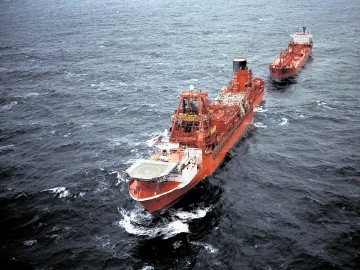
One of BP’s deep water fields west of Shetland has been shut down following the discovery of a “small” oil leak, the company confirmed yesterday.
Spokesman Matt Taylor said the oil and water mix had escaped through a hairline crack in a subsea flowline at the Foinaven field. The pipeline affected is on the seabed about two miles from the field production vessel, the Petrojarl Foinaven.
The leak was discovered by a remotely-operated vehicle carrying out routine inspection work in the field at 1.30am yesterday.
The field was immediately shut and oil stopped leaking at 2.20pm.
Mr Taylor said it was impossible to calculate at this moment exactly how much oil had leaked or how long it had been escaping for.
The last time the flowline was inspected was two months ago.
Mr Taylor said it was not a main production pipeline and was only used for testing flow rates from wells.
He added that 88% of the fluid in the pipeline was water and 12% was oil.
Mr Taylor said BP had carried out comprehensive checks of the area, no oil was visible and there was no evidence of pollution.
“Production remains shut down. An investigation into the cause of the incident will be carried out by BP,” said Mr Taylor.
Foinaven is 118 miles west of Shetland and has been in production since 1997. It produces around 40,000 barrels of oil a day.
It was the first UK deep water oil field to be developed in the Atlantic margin, and the water depth is nearly 1,500ft.
Though the Foinaven leak is obviously a concern, its size is dwarfed by BP’s Deepwater Horizon catastrophe in the Gulf of Mexico in April 2010.
The accident at the Macondo well killed 11 workers and spilled an estimated 4.9million barrels of oil into the sea.
Following the disaster, environmental campaigners joined forces with politicians across the world to demand a ban on new deep water drilling.
Oil giant Shell hit the headlines last August when it was accused of attempting to play down the significance of a North Sea oil spill after it emerged that the amount of oil which leaked into the water was more than 10 times larger than originally admitted.
The company initially said an estimated 120 barrels had been spilled in the incident at the Gannet Alpha platform, but later revised it to 1,300 barrels.
Recommended for you
